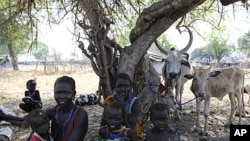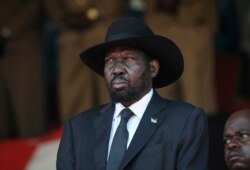As fighting in South Sudan's Jonglei state continues to spiral out of control, thousands of people including staff working for charity organizations have fled into the bush, forcing aid agencies to suspend operations in and around the Pibor Administrative Area.
The International Committee of the Red Cross (ICRC) said Thursday it is not able to evacuate and treat the wounded due to the escalating inter-communal violence in the area. International charity Medicine Sans Frontiers (MSF), or Doctors Without Borders, said it has suspended operations in Pibor after most of its staff fled with their families.
MSF and ICRC officials say they worry the sick and the wounded in the area who do not receive immediate medical attention will die.
Thousands of people from the towns of Gumuruk and Manyabol have fled into the bush as the clashes approach Pibor town, some 35 kilometers away, according to Ibrahim Mohamed, MSF Belgium Head of Mission in South Sudan.
"MSF received three patients with gunshots in our primary health center in Pibor. The fighting is now approaching Pibor town in the East, with almost all residents choosing to seek refuge in surrounding bushes, including MSF staff. Our staff fled with their families, fearing for their lives and those of their loved ones," Mohamed told South Sudan in Focus.
Mohamed warned that many more people could die in the coming weeks if the violence does not end.
"If the clashes persist, we can expect more wounded and we will soon arrive to the highest of the malaria season and without proper shelter, people will further be exposed to threatening diseases," Mohamed told VOA.
COVID-19 restrictions
The ICRC said Thursday it could not treat the wounded because their medical staff is following COVID-19 restrictions and are running short on capacity, according to Wolde Gabriel Saugeron, head of the ICRC sub-delegation in Bor.
"Due to COVID-19, our capacities have decreased a lot in terms of the beds we have to put in place, social distancing, that means our health facilities capacities have decreased — but more worrying, we have not been able to reinforce our team in those health facilities," Saugeron told South Sudan in Focus. "Therefore, we don't have full capacity to take care of these wounded people."
Since the intercommunal violence began to escalate in Greater Jonglei a few months ago, Saugeron says the ICRC has evacuated more than 300 injured people for treatment at its three facilities across the country. Saugeron worries that more of the wounded will die if the violence continues and there is no medical intervention.
"That is what we are trying to do, to access those communities and see also how we can support them, but of course our access is conditioned by the security situation on the ground and, for the time being, that is still not possible," said Saugeron.
Saugeron said it is very difficult for the ICRC to know exactly how many people are displaced until the violence stops.
Government panel
Last week, the ICRC said in a statement that during April and May, thousands of armed youth spent weeks mobilizing, preparing and trekking across Jonglei State, which is about twice the size of Switzerland. By the time they reached communities in and around Pibor, said the ICRC, rumors of imminent attacks had emptied towns and villages, leaving the elderly, women and children to bear the brunt of the attacks.
Earlier this week, President Salva Kiir formed a committee headed by Vice President James Wani Igga to come up with solutions to end the cycle of attacks and revenge attacks among the communities of Greater Jonglei. Kiir ordered the panel to report its recommendations within 21 days.
This story is from VOA's English to Africa South Sudan in Focus team.






